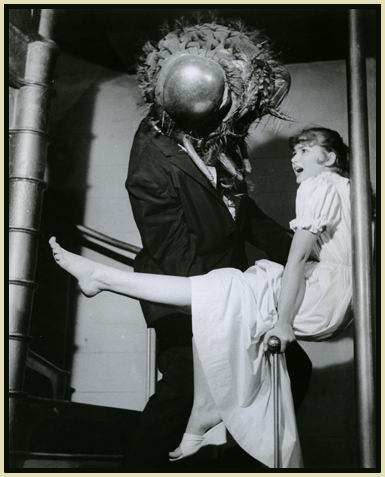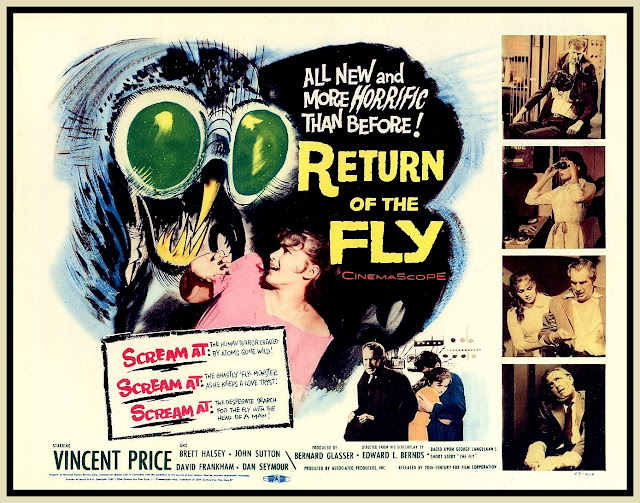Vincent Price (Francoise Delambre), David
Frankham (Alan Hinds), Brett Halsey (Philippe Delambre), Danielle De
Metz (Cecile Bonnard), John Sutton (Inspector Beauchamp), Dan Seymour
(Max Berthold)
PRODUCTION:
Director/Screenplay – Edward L. Bernds,
Producer – Bernard Glasser, Photography (b&w) – Brydon Baker, Music –
Paul Sawtell & Bert Shefter, Makeup – Hal Lierly, Art Direction –
John B. Mansbridge & Lyle R. Wheeler. Production Company –
Associated Producers.
SYNOPSIS:
After the funeral of his mother,
Philippe Delambre demands that his Uncle Francois tell him about the
experiments his father was involved in. Francois shows him but Philippe
then disregards Francois’s warnings and starts his own experiments in
matter transmission with the aid of his good friend Alan Hinds. However,
Alan is in fact a wanted criminal on the run from international police
and is intending to sell off plans of the matter transmitter. When
police start closing in on him, Alan uses the transmitter to dispose of
them. When Philippe finds out the truth, Alan throws him into the
transmitter too, placing a fly, one of Philippe’s greatest fears, in as
well. Philippe is rematerialized with a fly’s head and claw, while the
fly comes out with Philippe’s head and arm.
The original The Fly (1958) was one of the monster classics of the 1950s. It produced two sequels – this and Curse of the Fly (1965). While the original film was lavishly mounted for a 1950s sf/horror film, Return of the Fly
has been made much more as a B support feature – where the original was
in colour, for instance, this is made in black-and-white. Direction
this time was handed over to Edward L. Bernds, a B-budget director who
had made various Three Stooges and Bowery Boys efforts, as well as
several B science-fiction films (see below).
As sequels go, Return of the Fly
is a fair effort on its own undemanding grounds. It is necessarily
trapped by the very act of being a sequel. It lacks the same suspenseful
structure and surprise element that James Clavell’s script had – we
know where it is going to end up from the outset and as a result the
pitiful screams of “help me” lose their impact a second time around.
Still, the story has a degree of originality in the way it reintroduces
the same themes, offering a plausible reason for Philippe to start his
own experiments in matter transmission and an equally believable means
whereby he gets to become a human-fly. There are some odd moments that
achieve a nice ‘yechh’ effect – like the hamster that emerges from the
transmitter with human hands and the really gross scene where David
Frankham crushes the hamster under his foot. The fly has a head about
three times larger this time but is not a whole lot more convincing.
Director Edward L. Bernds made a number of genre films, including The Bowery Boys Meet the Monsters (1955), Bowery to Bagdad (1955), Jungle Gents (1956), World Without End (1956), Queen of Outer Space (1958), Spacemaster X-7 (1958), Valley of the Dragons (1961), The Three Stooges Meet Hercules (1962) and The Three Stooges in Orbit (1962).
SOURCE:HERE
IMAGES: Marcus Brooks
SOURCE:HERE
IMAGES: Marcus Brooks










No comments:
Post a Comment
WE ENCOURAGE YOUR COMMENTS AND OPINIONS ABOUT OUR POSTS. FEEL FREE TO LEAVE A COMMENT.